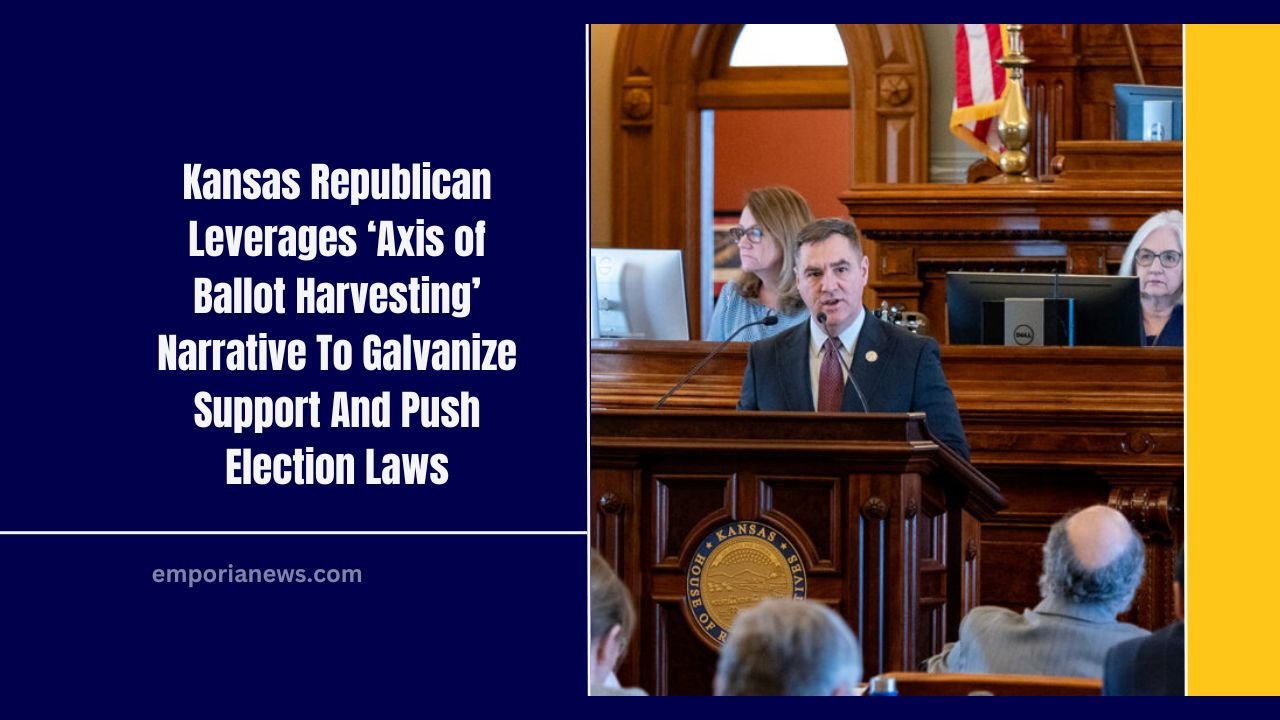In the heart of Kansas politics, a provocative narrative is taking center stage: the so-called “axis of ballot harvesting.” Coined and repeatedly invoked by Rep. Pat Proctor, this phrase has become a tool to criticize voting rights organizations, spread conspiracy-laden messages, and influence public sentiment ahead of the 2026 Secretary of State race.
But beneath the surface, critics argue, it’s a calculated strategy to manipulate fear for political gain.
Who Is Pat Proctor and What Is the ‘Axis of Ballot Harvesting’?
Rep. Pat Proctor, a Republican from Leavenworth and retired Army colonel, is in his third term in the Kansas House.
As chair of the House Committee on Elections, he is now running for Secretary of State — a position responsible for overseeing elections and voter registration across Kansas.
Central to Proctor’s campaign is the idea of a fictional coalition he calls the “axis of ballot harvesting.” According to him, this axis includes nonprofits like Loud Light, Kansas Appleseed, League of Women Voters, and the ACLU of Kansas — all of whom advocate for voter accessibility and have challenged Proctor’s legislative proposals.
Proctor implies that this “axis” is responsible for manipulating elections, promoting early voting “abuse,” and being financially backed by foreign actors, despite a lack of credible evidence.
Claims vs Reality: A Breakdown
Despite Proctor’s fiery rhetoric, official audits, recounts, and judicial rulings show no evidence of widespread voter fraud or foreign interference in Kansas elections. In fact, voter fraud has been found to be exceedingly rare, as affirmed by a 2018 federal court ruling.
Proctor has made repeated false claims, such as:
- Asserting young women “stole” the 2022 abortion amendment vote.
- Accusing Kansas Reflector and its parent, States Newsroom, of being funded by foreign nationals.
- Claiming doctored video footage despite evidence to the contrary.
These statements have been widely criticized, especially by watchdog organizations and journalists.
Key Facts and Figures
| Key Point | Details |
|---|---|
| Bill Introduced | HB 2106 – Requires disclosure of foreign donors for entities involved in campaigns on constitutional amendments |
| Vote Results | Passed House (94-25), Passed Senate (39-0) |
| Governor’s Action | Gov. Laura Kelly allowed the bill to become law without signing |
| Foreign Funding Claim | Proctor accuses Swiss businessman Hansjörg Wyss of funding States Newsroom |
| Verified Funding | Wyss Foundation gave $1.14M in 2020; States Newsroom discloses donors publicly |
| Lawsuit Filed | Voting rights groups have filed a federal lawsuit challenging HB 2106 |
| Quote from Proctor | “You are a partisan hack… your newspaper is a woke, leftist propaganda rag.” |
Campaign Strategy or Conspiracy Playbook?
Proctor’s messaging echoes the “axis of evil” language used by President George W. Bush in the 2000s. It serves a dual purpose: discredit opponents and attract far-right voters who are skeptical of mainstream media and early voting practices.
During a June 2024 election forum, Proctor criticized the surge of young female voters during the August 2022 abortion referendum, suggesting it was suspicious. Yet official post-election reviews found no irregularities, and the vote results were reaffirmed through recounts.
Proctor’s narrative has included statements that teeter dangerously close to antisemitic dog whistles, according to critics like Melissa Stiehler, advocacy director for Loud Light.
Legal and Electoral Implications
The newly enacted HB 2106 has drawn sharp legal scrutiny. It mandates that campaigners for or against constitutional amendments verify that they have not accepted large foreign donations.
While the bill passed with bipartisan support, its implementation raises concerns about free speech and press freedom.
Despite Proctor’s earlier comments in committee hearings where he assured journalists that the bill wouldn’t affect news organizations, his subsequent fundraising messages told a different story. In one, he suggested the law could be used to target Kansas Reflector with civil or criminal charges.
Voting rights advocates argue that such legislation and rhetoric are not only unfounded, but dangerous to the democratic process.
Rep. Pat Proctor’s claims of an imaginary ‘axis of ballot harvesting’ reflect a deeper political strategy: creating a villain to rally supporters and justify restrictive election laws.
While his assertions lack evidence, they pose real threats to voter confidence, journalistic freedom, and democratic discourse in Kansas.




